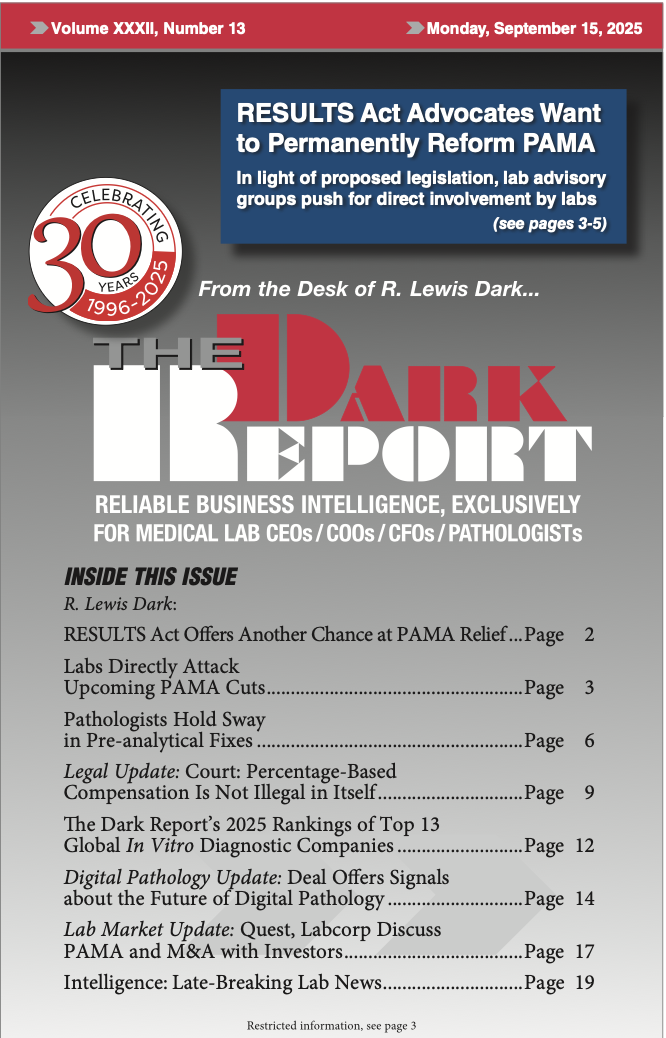Robert Michel
 Until Robert L. Michel came along and founded The Dark Intelligence Group (DIG) two decades ago, the clinical laboratory industry and the anatomic pathology profession lacked a trustworthy source for information about the management and operations of medical laboratories. From its inception in 1995, The Dark Report quickly became the “go to” source of industry intelligence, innovations in lab management, and strategic market analysis.
Until Robert L. Michel came along and founded The Dark Intelligence Group (DIG) two decades ago, the clinical laboratory industry and the anatomic pathology profession lacked a trustworthy source for information about the management and operations of medical laboratories. From its inception in 1995, The Dark Report quickly became the “go to” source of industry intelligence, innovations in lab management, and strategic market analysis.
This excellence in reporting has earned recognition from his peers. For example, twice Michel and The Dark Report have won national awards for best investigative reporting by the Specialty Information Publishers Association. In 2005, the award was for Michel’s coverage about how the anatomic pathology condominium laboratories (pod labs) operated by urologists and gastroenterologists came to be, who operated them, and how these owners marketed the AP condo labs to other physician groups. In 2009, Michel’s award for best investigative reporting resulted from his published interviews with Quest Diagnostics Incorporated when the company admitted that, for a period of 18 months, it had been reported inaccurate Vitamin 25(OH) D results because of problems with its laboratory-developed test methodology. The Dark Report’s story was picked up by The New York Times and was in the national news cycle for several days.
In his role as Editor-in-Chief, Michel brought unique capabilities to DIG and The Dark Report. His management training and diverse business experience—along with his skills as a concise writer and analyst—proved to be a winning combination for readers of The Dark Report. For that reason, Michel’s story has many intriguing elements.
Immediately prior to founding DIG, he had served in several executive positions for Nichols Institute based in Portland, Oregon, and San Juan Capistrano, California. This was during the time that Nichols Institute was an independent public lab company with annual revenues of about $280 million (prior to its acquisition by MetPath, Inc., now Quest Diagnostics Incorporated). He traveled extensively to many of the clinical lab business units owned by Nichols Institute in different regions of the United States and played a role in formulating effective market strategies in response to the emergence of closed-panel HMOs, capitated pricing, and full-risk managed care contracts, among other successful management initiatives.
Prior to his service at Nichols Institute, Michel served at three different Fortune 100 companies. These were Procter & Gamble, Centex Corporation, and Financial Corp. of America. Each was an opportunity to master new management techniques and apply them in different industries. Between these positions, he gained experience as an entrepreneur, having founded a real estate development firm and a general contracting company in the Southeastern United States.
Robert Michel earned a Bachelor of Arts degree in Economics at the University of California, Los Angeles, where he played rugby, a sport he participated in for another 22 years. He is a native of California and grew up in Santa Ana.
Articles by Robert Michel
“June 2, 1997 Intelligence: Late Breaking Lab News”
From the Volume IV No. 8 – June 2, 1997 Issue
With commercial laboratories pressing hospital laboratories for joint ventures, a unique selling proposition helps. MDS-AutoLab, Inc. of Canada has a different twist. They will not sell you their automated laboratory equipment. Instead, they offer it on a profit-sharing type of arran…
Ex-NHL Executives Buy American Medical Labs
From the Volume IV No. 7 – May 12, 1997 Issue
CEO SUMMARY: American Medical Laboratories’ sale to new owners is a major event. Not only does the new management team have a reputation for top performance in selling clinical laboratory services, but they also arrive with an ample war chest. When the revamped AML hits the competitive …
Regional Lab Systems Beginning To Emerge
From the Volume IV No. 7 – May 12, 1997 Issue
CEO SUMMARY: Regionalization of laboratory services is about to become a dominant industry trend. Four groups of players will drive this process and each needs to recruit hospital laboratories to participate in their regional model. This is the first generation of attempts to create finan…
New Hybrid Lab Systems Provide Peek At Future
From the Volume IV No. 7 – May 12, 1997 Issue
CEO SUMMARY: As the first generation of regional laboratory systems begin operation, the marketplace is about to separate winners from losers. Stakes are high for hospital laboratory administrators. If they choose to affiliate with the wrong model, the consequences can cause extended disr…
Partial List Of Regional Laboratory Networks
From the Volume IV No. 7 – May 12, 1997 Issue
Public Laboratories Struggling To Maintain Competitive Ability
From the Volume IV No. 7 – May 12, 1997 Issue
WITH regional laboratory systems as the theme of this issue, it is appropriate to look at the three national laboratories. What does 1997 and 1998 hold in store for them? For the last three years, news was uniformly bad for virtually every public laboratory. Problems at Corning Clinical Labo…
“May 12, 1997 Intelligence: Late Breaking Lab News”
From the Volume IV No. 7 – May 12, 1997 Issue
Beth Israel Medical Center in New York City is throwing a coming out party for their automated laboratory. Beth Israel is producing a two-day seminar on May 18-19 to demonstrate all aspects of their “totally automated core facility.” It was Carl Teplitz, M.D. who championed the a…
AmeriPath Stock Offering Pulled By Underwriters
From the Volume IV No. 6 – April 21, 1997 Issue
CEO SUMMARY: Ameripath planned to go public in March. However, the stock market’s significant decline and further evaluation of the company’s business plan caused Wall Street underwriters to defer issuing the stock. Pathologists are curious as to whether AmeriPath’s “employee” b…
Success Seems Elusive To Pathology Innovators
From the Volume IV No. 6 – April 21, 1997 Issue
CEO SUMMARY: Attempts to organize pathology practice management companies encounter resistance and market impediments. Success requires an astute business plan and a sophisticated management team to convince pathologists to abandon proven practice models and affiliate with regional or nat…
Where’s The Write-down ? LabCorp Faces Key Decision
From the Volume IV No. 6 – April 21, 1997 Issue
CEO SUMMARY: Commercial laboratories are recognizing declines in the market value of their assets. LabCorp has yet to do the same. Taken cumulatively, these write-downs demonstrate the sizable revenue erosion that large commercial laboratories experienced during the past three years. Soon…
CURRENT ISSUE

Volume XXXII, No. 13 – September 15, 2025
The Dark Report examines a new bill that would reform PAMA and avoid reimbursement rate cuts scheduled for January 2026. Clinical laboratory leaders are urged to make their voices heard in Congress. Also, an expert describes how labs can fix pre-analytical errors and avoid disaster.
See the full table of contentsHow Much Laboratory Business Intelligence Have You Missed?
Lab leaders rely on THE DARK REPORT for actionable intelligence on important developments in the business of laboratory testing. Maximize the money you make-and the money you keep! Best of all, it is released every three weeks!
Sign up for TDR Insider
Join the Dark Intelligence Group FREE and get TDR Insider FREE!
Never miss a single update on the issues that matter to you and your business.
Topics
- Anatomic Pathology
- Clinical Chemistry
- Clinical Laboratory
- Clinical Laboratory Trends
- Digital Pathology
- Genetic Testing
- In Vitro Diagnostics
- IVD/Lab Informatics
- Lab Intelligence
- Lab Marketplace
- Lab Risk & Compliance
- Laboratory Automation
- Laboratory Billing
- Laboratory Compliance
- Laboratory Equipment
- Laboratory Information Systems
- Laboratory Management
- Lean Six Sigma
- Managed Care Contracts
- Molecular Diagnostics
- Pathology Trends
- People
- Uncategorized

